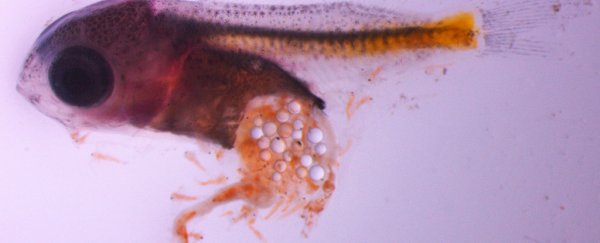A group of experts has just concluded that a widely reported, peer-reviewed paper on the negative effects of microplastics on fish should be retracted because its authors have committed "scientific dishonesty".
For more than 10 months now, this case has caused a storm in a very small research pond. The paper in question was written by two Swedish scientists who study the ecology of the Baltic Sea. And now it's looking like a pretty bad case of research fraud.
Last June, Science published a four-page paper by ecologists Oona Lönnstedt and Peter Eklöv from Uppsala University in Sweden. They had discovered that the larvae of European perch (Perca fluviatilis) get addicted to eating microplastics, which stunts their growth, makes them more vulnerable to predators, and increases fish mortality.
"If early life-history stages of other species are similarly affected by microplastics, and this translates to increased mortality rates, the effects on aquatic ecosystems could be profound," they wrote.
They had based their results on work done in 2015 at the Ar research station in Gotland, a Swedish island in the Baltic Sea. The "profound" conclusions were reported by many outlets around the world.
But as soon as the paper was published, that story started to unravel.
As you can imagine, the research community of fish ecologists in the Baltic region is quite small. It wasn't long before a team of researchers submitted a formal letter to Uppsala University, wishing to report "a strong suspicion of research misconduct".
This team was led by Josefin Sundin, a friend and colleague of Lönnstedt, and Fredrik Jutfelt from the Norwegian University of Science and Technology.
Both had worked at Ar research station when Lönnstedt was conducting the microplastics study, and said things just didn't add up.
As Martin Enserink reports in Science news, Lönnstedt hadn't been on the island long enough to do the research the way it was described - and there were witnesses.
"There was a description of this big experiment, and I had absolutely no recollection of it," Sundin told Enserink late last year.
There were also signs of missing data, inconsistencies in sample sizes, a lack of animal ethics committee approval, and issues with statistical design. A significant lack of raw study data had been chalked up to the theft of Lönnstedt's laptop shortly after the paper was published.
The alarm-raising letter triggered an internal investigation at Uppsala University, which concluded in September 2016 that there was no evidence of research misconduct.
"Although we have always been confident about our own innocence it is very stressful to be attacked by a group with the only purpose of discrediting our research," Eklöv told Alison McCook at Retraction Watch in response to these results.
But that wasn't the end of it.
The Swedish government soon got involved, and the Central Ethical Review Board launched an independent investigation.
After eight months of back-and-forth, including additional documentation and responses from the accused researchers, the expert group has concluded that "suspicions of dishonesty cannot be dismissed".
The experts also had some scathing remarks for the journal that accepted the paper for publication, following peer review.
"It may be considered particularly remarkable that the article was sent for publication without the presence of the necessary data. It is worth pointing out here that the journal Science was deficient in its checking in this respect," they write.
In fact, the panel has made it clear that the paper should be retracted, and Science has taken that on board - they are currently preparing a retraction statement. The disgraced researchers have not yet commented on this outcome.
Meanwhile, the results have been a relief to the original whistleblowers Sundin and Jutfelt, who were pretty stressed out by the whole scandal.
This case could actually have a wide-reaching impact on how Sweden deals with allegations of research misconduct, as it now appears universities are struggling to properly investigate their own scientists.
Just last year, this problem was brought to light by the scandal with celebrity surgeon Paolo Macchiarini, whose gross ethical misconduct was also initially dismissed by his institution, the Karolinska Institute.
But there is plenty of good science on the devastating impacts of plastic pollution on our environment, so this one retraction definitely doesn't mean we should stop worrying about microplastics.
In fact, several countries, including the US and Canada, have banned the use of microbeads - a major type of microplastic that's found in beauty products such as exfoliating body washes - based on overwhelming evidence that they're damaging marine ecosystems.
By 2050, scientists predict that there'll be more plastic than fish in our oceans. So, regardless of the fact that this one paper appears to have contained some really dodgy science, it should not lessen or concern about the small pieces of plastic clogging up our waterways.
But it's good to know that science can recognise and fix mistakes when they find them, to ensure that we're working with the best information going forward.
The soon-to-be-retracted paper was published in Science. You can read the full investigation report here.
